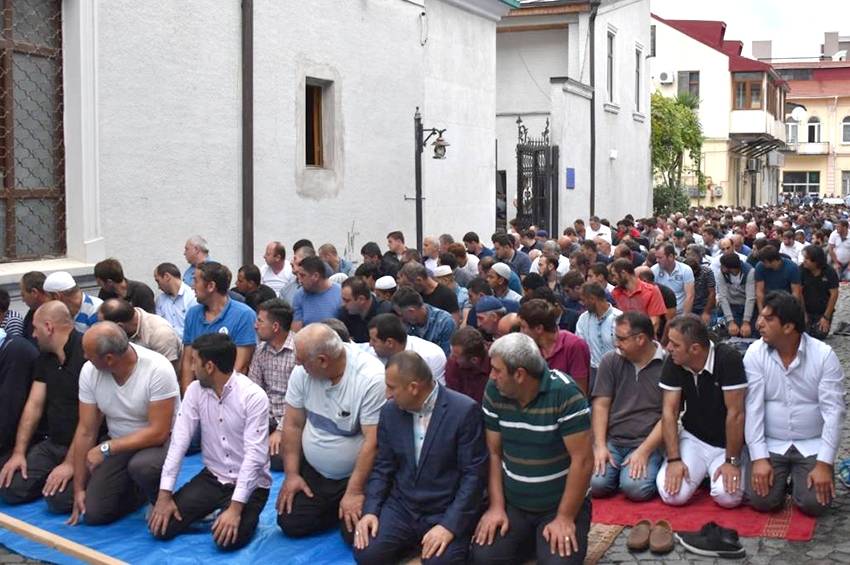საერთო ცხელი ხაზი +995 577 07 05 63


Photo: Jam-news
Batumi City Hall continues to disregard the religious rights and needs of the Muslim community and is trying to delay the process even after a two-instance court ruled in favor of human rights and equality in the construction of a new mosque in Batumi.
The decision of the Kutaisi Court of Appeals of April 13, 2021, which upheld the decision of the Batumi City Court on the construction of a new mosque in Batumi, was appealed by the Batumi City Hall to the Supreme Court of Georgia last week. Against the background of this decision of the Batumi City Hall, on July 20, the New Mosque Construction Fund in Batumi also filed a cassation appeal to the Supreme Court, where it demands to directly oblige Batumi City Hall to satisfy the first stage of the mosque construction permit.
As it is known to the public, the Kutaisi Court of Appeals in its decision of April 13, 2021 shared the assessment of the Batumi court on the issuance of the first stage of the construction permit for a new mosque in Batumi about the illegality of the Batumi City Hall refusal and discriminatory treatment of plaintiffs on the grounds of religion. Unfortunately, even after the decision of the two-instance court, the Batumi City Hall is still resorting to the strategy of artificially delaying the process and, despite the obviously low chances of achieving change at the cassation hearing stage, is appealing the decision to the Supreme Court.
***
As it is known, the subject of dispute in the case of the new mosque in Batumi is the legality of the 2017 acts of the Batumi City Hall on the refusal of the zonal agreement and the first stage of the construction permit. Batumi City Court, in the most important decision of September 30, 2019, recognized the mentioned acts as illegal and satisfied the plaintiff's demands for their annulment and the establishment of discriminatory treatment on the grounds of religion.
The courts of both instances held that the grounds for refusal indicated in the disputed acts of the City Hall had not been thoroughly studied and examined, which is why they were contrary to the applicable construction legislation. During the administrative proceedings, the Batumi City Hall had to investigate all the circumstances relevant to the case, including the fact that the Batumi City Hall had not considered the cultic building as a social need and demand of the Muslim parish.
The Appeals Chamber further notes that, on the one hand, the local self-government of Batumi gives the Orthodox Church the opportunity to build places of worship on municipal-owned plots of land, in densely populated neighborhoods, and enjoy freedom of religion, while on the other hand, refuses Muslim community to build a cultic building on their own land on the basis of protection of urban development interests argument.
The Appeals Chamber, like the City Court, shared the position of the New Mosque Construction Fund in Batumi, arguing that it would be unfounded to claim that the municipality treated both religious communities equally, since, under identical conditions, there are clearly two different legal consequences.
The Kutaisi Court of Appeal, as well as the Batumi City Court, did not satisfy the Fund's third request, which was to instruct the Batumi City Hall to comply with the first stage of the construction permit in order to eliminate the consequences of discriminatory treatment. Accordingly, it was this part of the request that the Fund appealed to the Supreme Court.
The demand for the construction of a new mosque in Batumi is a historical demand of the Georgian Muslim community, which stems from the need for a place of worship in the city. In recent years, hundreds of Muslims have had to celebrate Friday Juma prayers and other holidays in the open air on the street. Despite numerous public promises from the authorities, the issue has not been resolved, which has forced the Muslim community to self-organize, purchase land, and go through a long and difficult road to obtaining a building permit. This struggle for the recognition of a shrine and cultural space in the center of Adjara continues to this day.
Obstruction of the process of building a new mosque in Batumi reveals the state's discriminatory policy in the field of religious freedom, which has been demonstratively neglecting, hierarchizing and non-recognizing non-dominant religious associations and their rights and needs for years. Discriminatory policies of the state are seen in many aspects of relations with religious organizations, including funding, protection of property rights, construction of religious buildings, protection of cultural heritage, education, political rhetoric.
The interests of the “New Mosque Construction Fund” in Batumi are represented in court by the Institute for Tolerance and Diversity (TDI) and the Center for Social Justice (formerly EMC).
The website accessibility instruction